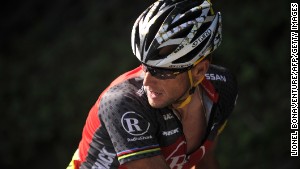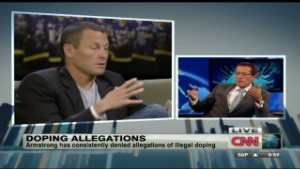
- Cyclist Lance Armstrong involved in world's "most sophisticated" doping program, agency says
- More than a thousand pages of evidence are due to be released today
- Armstrong has long denied using performance-enhancing drugs
- He won seven Tour de France titles from 1999 to 2005
(CNN) -- Cyclist Lance Armstrong was involved in "the most sophisticated, professionalized and successful doping program that sport has ever seen," the U.S. Anti-Doping Agency said Wednesday in preparing to release more than 1,000 pages of evidence in the case.
The evidence involving the U.S. Postal Service-sponsored cycling team includes "direct documentary evidence including financial payments, emails, scientific data and laboratory test results that further prove the use, possession and distribution of performance enhancing drugs by Lance Armstrong," the agency said in statement.
Armstrong: It's time to move forward
In August, four days after a federal judge dismissed Armstrong's lawsuit seeking to block the agency's investigation, the seven-time Tour de France winner announced he would no longer fight the accusations. The agency then announced it would ban Armstrong from the sport for life and strip him of his titles dating back to 1998.
 Brennan on Armstrong: 'He gave up'
Brennan on Armstrong: 'He gave up'  Armstrong won't fight doping charges
Armstrong won't fight doping charges  A snapshot of Lance Armstrong's future
A snapshot of Lance Armstrong's future "The USPS Team doping conspiracy was professionally designed to groom and pressure athletes to use dangerous drugs, to evade detection, to ensure its secrecy and ultimately gain an unfair competitive advantage through superior doping practices," the agency said.
The scope of evidence against the team, including testimony from 11 team members who came forward to testify about their own involvement, is "overwhelming," according to the agency.
The organization is not a governmental agency but is designated by Congress as the country's official anti-doping organization for Olympic sports.
Your Armstrong questions answered
Armstrong has consistently denied doping accusations. Neither he nor his manager, Mark Higgins, immediately returned telephone calls Wednesday seeking comment.
Between 1999 and 2005, Armstrong won seven consecutive Tour de France titles, despite persistent accusations that he had used performance-enhancing drugs.
In February, the U.S. Justice Department closed a criminal investigation into illegal drug use by Armstrong without filing charges. The Anti-Doping agency filed its own case, which does not carry criminal penalties, in June.
One of the Armstrong's former teammates, George Hincapie, released a statement Wednesday acknowledging that he had used banned substances and saying he had been approached by federal investigators two years ago to discuss his knowledge of the doping activities by the team.
He did not mention Armstrong by name.
Opinion: Armstrong and the tenuous nature of heroism
"I would have been much more comfortable talking only about myself, but understood that I was obligated to tell the truth about everything I knew. So that is what I did," Hincapie said.
"Cycling has made remarkable gains over the past several years and can serve as a good example for other sports," he said. Thankfully, the use of performance enhancing drugs is no longer embedded in the culture of our sport, and younger riders are not faced with the same choice we had."


